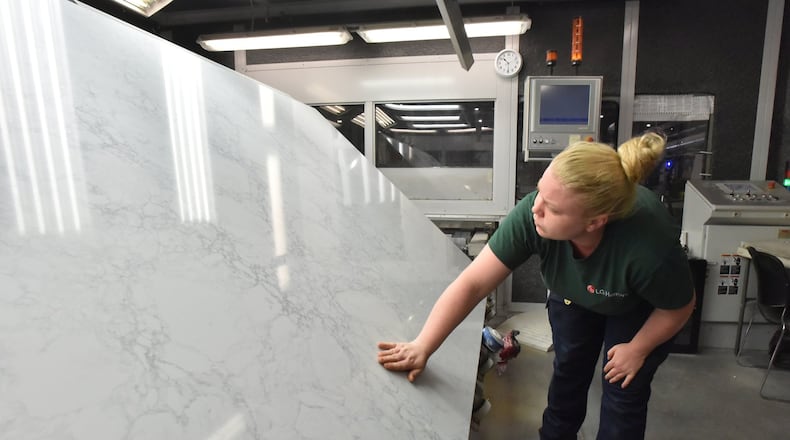Jacques Steyn sloshed through the puddle, one of many on the shop floor, to point out the slicing, whirling diamond blade as it slashed through a thick slab of quartz. The blade worked its magic with the help of a pressurized water jet that blasts water at 60,000 pounds per square inch.
"That blade costs $600," said Steyn, president of Mega Granite & Marble, Inc. "And if you are lucky, it'll last two shifts."
The Newnan-based company is now wrestling with another big cost: U.S. duties on quartz imported from China, a particularly hard-hit material in the broader bilateral trade war. Steel and aluminum have received a lot more attention, but higher prices for quartz will be felt by home buyers and renovators.
The demand for quartz has surged as high-end countertops made from that material have increasingly replaced marble and granite. Now, higher costs also could endanger companies that often work with imported quartz, like Mega Granite, which have seen years of rapid expansion.
It is a conflict that doesn’t just pit the U.S. against China, but American companies against each other and Republican against Republican.
Minnesota-based quartz manufacturer Cambria last year charged that China's government subsidized their factories' quartz production and that many Chinese factories also "dumped" quartz – that is, sold large quantities to Americans at sub-market prices in order to snare more sales.
Cambria asked the Commerce Department to slap huge duties on Chinese quartz. Last fall the department obliged, imposing duties of up to 178% for unfair subsidies and up to 341% for dumping. The duties are in addition to broader Trump administration tariffs of up to 25% on about $200 billion of Chinese imports including quartz.
The duties were endorsed by U.S. Rep. Jim Hagedorn, a Republican who represents Cambria’s Minnesota district. But in mid-May, U.S. Sen. Johnny Isakson backed Cambria’s critics. In a letter to the Commerce Department, the Georgia Republican warned that if Cambria gets its way, “successful businesses in Georgia will be forced to cancel plans for expansion or, in some cases, possibly even shut down.”
The duties are being reviewed by the International Trade Commission, which also is weighing Cambria's request to impose duties for quartz purchased from China in the 90 days before the duties were announced. Cambria and its critics – including some Georgia importers – testified in May. A decision is expected June 11.
In the meantime, importers have scrambled for alternatives, mainly turning to Turkey and India. But China is the biggest exporter and, until last year, its prices were cheaper.
“Almost our entire quartz program had come from China,” said Marisa Bedrosian, corporate counsel for Bedrosians Tile & Stone, the California company her grandfather founded, which has a showroom in Morrow. “It is a huge problem to re-source all your quartz from other countries.”
Complicating matters, Cambria also has filed a request to impose large duties against India and Turkey. Cambria declined to divulge where it obtains its quartz. Industry insiders believe that it gets at least some of its supply from Canada.
Nationally, 25,000 Americans work at thousands of small- and medium-sized quartz producers, according to the American Quartz Worker Coalition, a group of quartz companies. Among them are more than 100 outfits in Georgia, including Mega Granite, with 142 employees and 32 installation crews.
Many employees at Mega Granite have been working 60 hours a week to fulfill demand for quartz countertops, said Steyn, the president. “I’m very concerned about Mega’s future growth when it comes to the availability of materials.”
Quartz in homes, offices, Mercedes-Benz Stadium
Quartz starts as a rock. But unlike granite, which is sliced out of mountainsides and polished to make countertops, quartz counters are human-made. Manufacturers combine quartz rocks and powder with various chemicals, resins and pigments to make slabs. The slabs are typically harder and less porous – and generally more expensive – than granite.
The heavy slabs are taken by fabricators like Mega Granite that cut, shape and polish the quartz into a product installed in homes, offices, hotels and other venues like Mercedes-Benz Stadium. Mega Granite says its work at the stadium included quartz countertops for Arthur Blank's suite.
"The durability, functionality and beauty of quartz has made it a hit," said Jennifer Foresman, an Atlanta-based design consultant and owner of Madison & Wells Design.
The United States provides just a fraction of the world’s quartz – less than 6%, according to the World Atlas. China ranks first in exported quartz, with 16%, followed by India, Turkey, Brazil and Spain. Canada accounts for less than 3%.
China’s quartz footprint in the United States has surged from just $5 million in 2010 to $459.6 million in 2017 and $526 million during the first nine months of last year, according to industry sources citing Census Bureau data.
Importers say that reflects quartz’s popularity. Cambria says the flood proves that the Chinese aren’t playing fair.
“Every sale of quartz surface product that involve the Chinese import product is a sale that Cambria can and should earn,” Marty Davis, Cambria’s chief executive, testified to the ITC in mid-May, adding that the company had laid off several hundred workers.
Builders are trying to cope as the cost of quartz countertops rises, said Vincent Longo, president of Atlanta-based Longo Custom Builders, which builds customized homes, usually selling for $800,000 and up.
Longo said the price of quartz went from $46 a square foot to $60 a square foot in two months. In one home he was building, that added about $3,200 to the cost of kitchen countertops, to $17,000.
With costs rising for other materials as well as labor, a builder's wiggle room for pricing has shrunk, Longo said. "You've been able to find some of the less-expensive quartz out there, but I think we are about through it."
One option is to revert to granite – good for the builder’s costs, although not for the quartz companies. “We pass along most of the increase to customers because we have to stay profitable,” Longo said. “We try to absorb what we can. But we can’t eat all that, which results in higher-priced homes.”
Round-the-clock production in Adairsville
While they wait for the ITC decision, the region’s quartz manufacturers and fabricators are working overtime.
The state's largest maker of quartz slabs is LG Hausys. The company's headquarters are in Atlanta, with production on 67 acres in Adairsville, about 65 miles north. Nearly 300 workers staff two huge production lines roaring 24 hours a day.
Each day, the facility blends quartz powder and pebbles, heating and drying the mixture, to churn out 900-pound slabs of quartz. About 400 slabs are shipped each day to fabricators that cut and shape the quartz into a product for customers.
LG Hausys had been buying raw materials – quartz rock – from China, but also some slabs from China, because it needed to meet demand while it is expanding, according to Mike Morici, director of surface products. When the duties hit, LG Hausys found other countries to shop for raw materials and slabs.
The company can't make slabs fast enough to meet demand, so LG Hausys is building a third production line and considering a fourth, said Dan Prokop, a production director. But higher costs could kill those expansion plans, he said.
In Newnan, Mega Granite too is thinking of expansion. Maybe.
The company has a deal to buy 30 acres nearby as part of an ambitious expansion plan, said Steyn, the president. "My worry is, how much can we take until we think, 'It's not worth it.'"
Why the quartz controversy matters
Who is hurt: Any company that imports quartz rock and powder from outside North America. With China effectively shut off, prices of quartz from other sources are rising. That raises prices for home builders
What's at stake: Roughly 25,000 American jobs. In Georgia, precise numbers are hard to come by. The largest company is LG Hausys, which makes quartz slabs in a large Adairsville plant. The slabs are turned into countertops by "fabricators." There are an estimated 200 fabricators in the state with thousands of workers, according to industry officials.
Why it matters to consumers: Quartz used in kitchen and bathroom countertops has become more expensive. That means builders and home renovators can either swallow the added cost or raise their prices to homeowners. Faced with higher prices, some people may shift to granite or marble.
Sources: World Atlas, American Quartz Workers Coalition, International Trade Commission
About the Author
Keep Reading
The Latest
Featured








